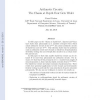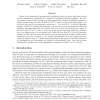85 search results - page 3 / 17 » A note on circuit lower bounds from derandomization |
FSTTCS
2004
Springer
14 years 25 days ago
2004
Springer
We consider hypotheses about nondeterministic computation that have been studied in different contexts and shown to have interesting consequences: • The measure hypothesis: NP d...
FOCS
1999
IEEE
13 years 11 months ago
1999
IEEE
Various efforts ([?, ?, ?]) have been made in recent years to derandomize probabilistic algorithms using the complexity theoretic assumption that there exists a problem in E = dti...
CORR
2010
Springer
13 years 7 months ago
2010
Springer
In their paper on the "chasm at depth four", Agrawal and Vinay have shown that polynomials in m variables of degree O(m) which admit arithmetic circuits of size 2o(m) al...
COCO
2004
Springer
13 years 11 months ago
2004
Springer
Based on the framework of parameterized complexity theory, we derive tight lower bounds on the computational complexity for a number of well-known NP-hard problems. We start by pr...
CIE
2010
Springer
14 years 8 days ago
2010
Springer
In this note, we use lower bounds on Boolean multiplicative complexity to prove lower bounds on Boolean circuit complexity. We give a very simple proof of a 7n/3 − c lower bound ...


